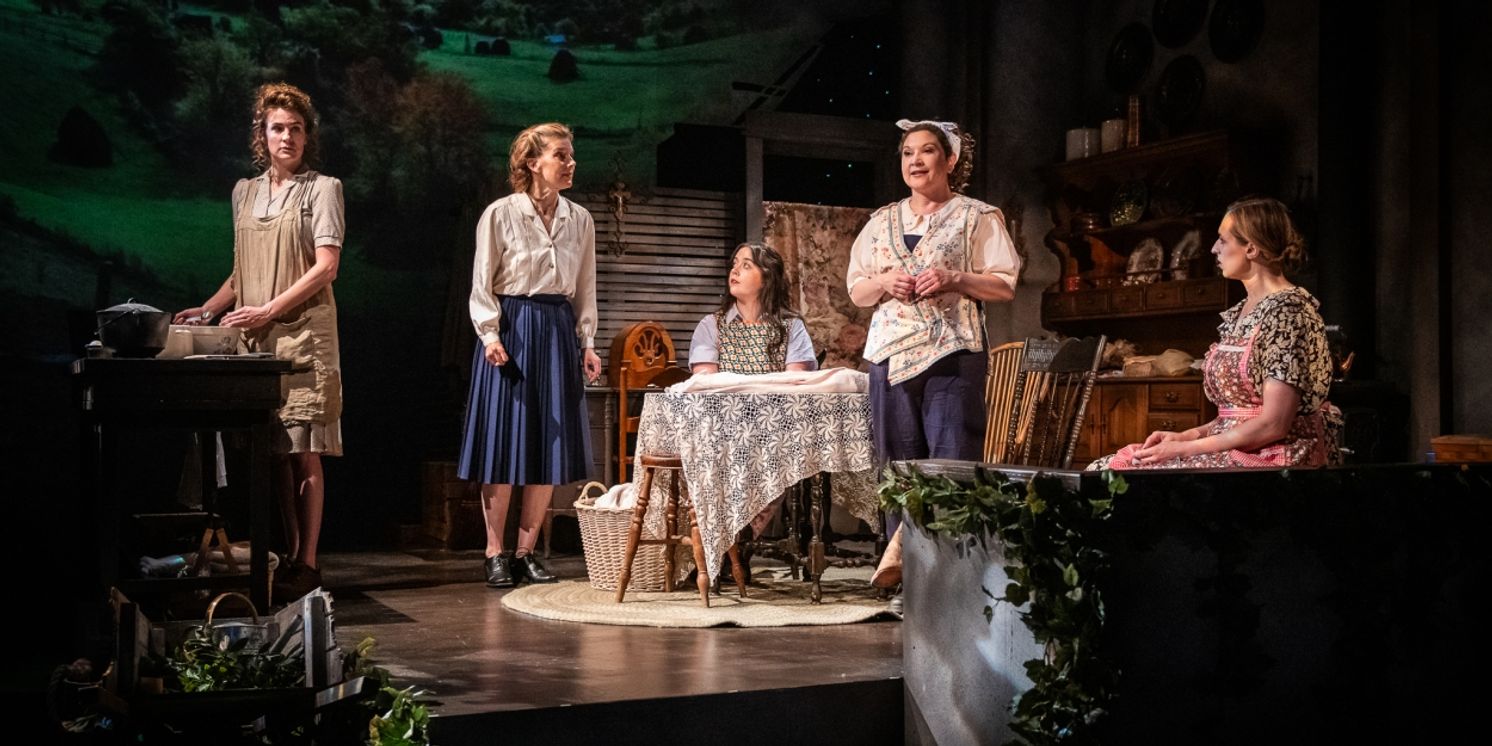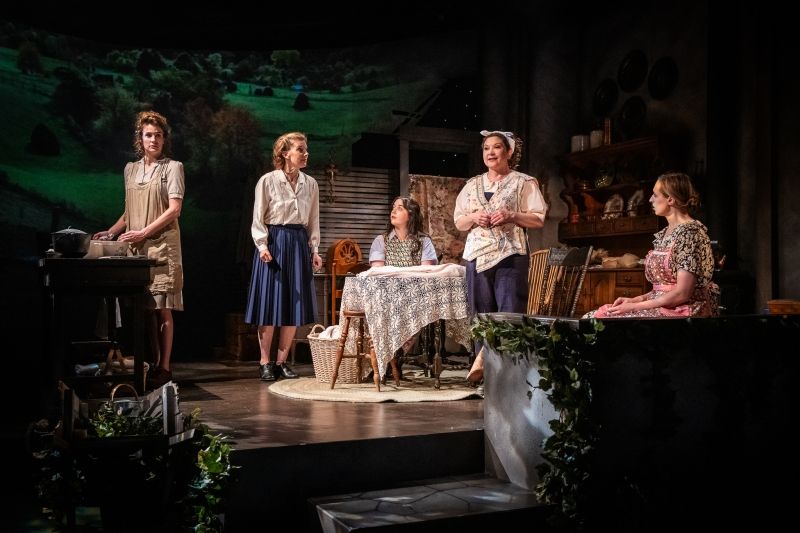Review: DANCING AT LUGHNASA at SecondStory Repertory
Now through August 27th


Sanai Buron, and Colleen Davis in DANCING
AT LUGHNASA by SecondStory Rep
Photo Credit: Michael Brunk of NWlens.com
DANCING AT LUGHNASA at SecondStory Repertory is a glimpse into the past and a way of life that has disappeared. It is not an idyllic revelry but rather an examination of a time when people who were caught between two wars struggled to find balance amidst many opposing forces. It is a show where the unspoken is often the loudest character. With heart and grace and a touch of resignation, the Mundy sisters invite you to walk along with them for just a while.
DANCING AT LUGHNASA follows the story of the Mundy sisters in the fictional town of Ballybeg in County Donegal in Ulster. The five sisters are all unmarried and supported by the income of the eldest, Kate, who is a school teacher with some meager supplemental funds from Agnes and Rose who knit gloves to sell in town. Their older brother Jack has just returned from twenty-five years of service as a missionary in Uganda. He is suffering from malaria, trying to remember his English, and mostly feeling like a fish out of water. Christina has a seven year old son, Michael, upon whom all the sisters dote. But Christina’s unmarried status is only one of the things that puts the family’s standing in jeopardy in the community. Jack’s return while welcome ruffles some feathers as he seems to have abandoned most of his traditional Irish Catholic views. Now Kate’s job security is in question, and a new knitwear factory is putting Agnes and Rose out of business. Michael’s father, Gerry, drops in unexpectedly as always making more promises that he can keep. Through it all Maggie attempts to keep their dinners interesting and steals moments of pleasure by dancing to the music on the Marconi wireless radio or relishing the last fag from her apron pocket.
The cast of DANCING AT LUGHNASA appears to be a close knit group. You can feel the affection and connection between them. Molly Hall as Kate Mundy carries the worries of the world. The usual sparkling Hall is subdued, almost knotted with tension. She is trying to hold them all together, and her care-worn spirit is evident in her gaze, her walk, and mostly her hands which she uses to shield herself when it all becomes a bit too much to bear. Ingrid Sanai Buron has the very difficult task of portraying Rose Mundy, the sister with some type of learning or mental disability. What is most striking is Buron’s ability to give Rose her own will and determination. The play was almost halfway over before I could be decidedly sure that Rose had any deficits. Mark Kunts as Gerry Evans is the perfect blend of trouble and charm. His affable demeanor leaves little to wonder why Christine falls under his spell every time he returns. Jillian Faulk as Christine Mundy is a whirlwind of emotions. You can see her nerves at Gerry’s return and can’t help but waltz along with her as her resolve melts in his embrace. Mary Guthrie as Maggie leans into the cheekier side of the character and provides some much needed exuberance. Her face lights up when presented with the tiniest sliver of hope. Yet she allows us to also see the dark clouds of unlived dreams that are her constant companions. Life is hard, but she refuses to let it make her hard. This is by far my favorite performance I have seen by Guthrie. Colleen Davis plays Agnes Mundy as still water that runs deep. She is quiet and unassuming, yet you can feel her taking it all in. Agnes isn’t given much of an individual storyline for herself, but Davis gives her presence a weight that allows you to know how important she is to the family. Eric Hartley portrays Father Jack Munday with a gentle spirit and as one caught between two worlds. His sincerity is beautiful, but his story is full of holes. The audience is left to guess many things about Jack and his time in Uganda, and the range of possibilities is great. I do wish that the dialogue had been more explicit about his time in Uganda causing him to lose his Irish accent as without being given a definitive reason, some may attribute it to less generous explanations. Jag as Michael and also the narrator is tasked with the heavy load of providing context and exposition. At times he feels a bit to set apart, at least emotionally, from the story. He comes alive most when talking about Gerry, but I wish I had seen the same connection to the events surrounding his aunts.
The production of DANCING AT LUGHNASA is at once lavish and sparse. The scenic design and projections by Mark Chenovick are layered with details and points of interest but little is given to help the audience navigate the complex world of Ireland in 1936. Director Doug Knoop keeps the play on track with a quick pace that has a nice rhythm of times that pause and others with an uptick of action. Despite the small space, Knoop was able to keep both the actors and the action moving while simultaneously creating beautiful tableaux. The Irish dialects are spot on and really help take you to that place. However, with the quick pace of dialogue, the audience must be attentive in order to catch everything. I can’t quite put my finger on why, but Jillian Faulk particularly had a wonderful lilt to her voice. Costume design by Elizabeth Shipman accentuates each character’s personality while also fitting within the story as a whole.
DANCING AT LUGHNASA is like a window into a time and place. We are dropped into a moment before which much has happened. And just as the characters do not have all the answers to the hows and whys of life, the audience is left on its own to speculate motives, motivations, and even circumstances. While one can choose to infer that many of their tribulations were holdovers from the Great War and the economic depression, it is never made clear which troubles came from forces beyond their control and which were the result of the prejudices from their own neighbors. This show requires much from its audience and may not be everyone’s cup of tea. But for those who enjoy a show upon which they can ruminate, it has much to offer. Caught in a web of troubles with limited resources and agency, the Mundy sisters find their way in life and into our hearts. The show runs through August 27th.
Reader Reviews

Videos

